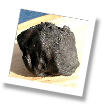Where can you find meteorites?
Everywhere and nowhere If you want to believe in the statistics, then there is a meteorite per 1 km² of earth's surface, which is waiting on its discovery. Only if we are accurate, there are only little areas in Europe, where such a meteorite can remain on the surface over years after it is left from a fall on the Earth's surface. If we are honest we must admit that the biomass grows in such a rapid way in Central Europe that you barely must wait a year before a freshly fallen meteorite disappears in the mould and with it goes missing. Otherwise the distribution of those stones is quite unfair, because there are far many pieces per square kilometer at a fall of a large meteor shower. That may well be hundreds of pieces! In contrast large areas be left without a single meteorite. If you absolutely want to ascend from a meteorite searcher to a meteorite finder, then you should try it there, where you know there is recently fallen a meteorite or try in those areas where nature or men boost stagnation or even an erosion of the surface
Practice makes perfect People, who are looking for meteorites, should first think about what exactly they want to search! It is a huge difference whether you are searching an old, heavily rusted iron meteorite or a fresh black stony meteorite. One is to find only to find in the ground, the other lies on top of the ground. One you can search with metal detectors, the other you can not. There is also a lot of difficulty in visual search, when you are looking for a blackish and complete individual and when you don’t adjust also to the possibility that you only can come upon an open light grey fragment. What should you do? Notice all bright objects consciously; or rather look for black objects? It must be also clear for everybody that big heavy meteorites have so much force that they will not be found at the surface. So if you want to search for main masses, you should be well advised to deal more with holes in the ground, than looking for black stones! It may be worth more to search for small meteorites, because they just occur more often than the main mass. On the other hand are those little objects more difficult to discover, if they fall in untouched nature. One should not capitulate to try it again. For exercise, take just a golf ball, paint it black and with that go to the next meadow. Now you can generate a "private meteorite fall” by yourself. Throw now the ball as far as possible. You know, just on this meadow is my "golf ball meteorite". That is already more than you can expect in real search, because who tell you that even on that field then a meteorite is situated? But back to exercise. Either you are searching immediately or you come back tomorrow into the meadow to find the golf ball. You will realise how difficult this can be, especially the unclear the area is. | ||||
 | ||||
Meteoritic Science

![]()
![]()
| ERFM |  | English |  | Meteorites |  | Where can you find meteorites? |


![]()





